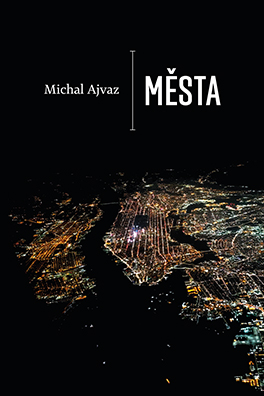
Original title: Města
Genre: novel
Publisher:
Druhé město, 2019
ISBN: 978-80-7227-422-2
Pages: 736
Rights sold to:
Poland (Stara Szkoła), Bulgaria (Ergo)
The narrator promises the wife of his old friend Štěpán that he will attempt to track down a mysterious flash disk in Stockholm, which by a strange twist has thrown Štěpán into a state of mental turmoil and yet which at the same time is the only thing in the world that can overcome his despair. The flash disk is no longer in Stockholm, so the narrator sets out once more upon its trail, until his search eventually turns into a round-the-world journey, leading him from Sweden to Norway and then to Holland, Ireland, France, the east and west coasts of the United States, Japan and Poland. On his way he meets a lot of people, gets to know their stories and listens to their narrative about a transforming statue, an edible mosaic, the parts of a mysterious machine, the birth of a novel from a single sentence in a book bought at a market in Seoul, a composition that was written as the accompaniment to a dance of shadows on a wall, the tragic end of a French oceanographer, the literary work of an eccentric Bavarian mayor, the Blue Pegasus Company's journey to the West and a religion that was born online.
"Book of the Year 2019 for me was Michal Ajvaz's Města / Cities, a grand attempt to create the Hero's Quest for the Golden Fleece or for some other wonder in a contemporary form, this time based on modern electronics."
Milan Uhde, writer, Book of the Year 2019 Lidové noviny poll
"A mysterious detective story, cosmic sci-fi, psychological novel and travelogue. This and much more is offered by the latest novel from a much-awarded Czech writer (…) Although it goes beyond the traditional yardsticks of genre work and might be called Hochliteratur, readers should not miss out on this 700+ page novel.
(…)
The author has worked dozens if not hundreds of microplots into a single book. These are always impressive and always somehow associated with the location where a translator is looking for a mysterious magical object. At the same time all the characters and their lives are linked by something unspoken, with which Ajvaz succeeds in keeping a seemingly fragmented, motley narrative together in an incredible manner."
Stanislav Šulc, Moravskoslezský deník
"Because this narrative is not shaped by the voice but by the ear, the reader may discern in the rustle of a curtain (one of the typical motifs in Michal Ajvaz's books - translator's note) a narrative about the uncertainty that releases everything from its chains, about the myths that you think up to believe, about the origins of art and the concealed source of stories, about the development of human societies, the tangible and intangible world, the need for the order of things and perhaps also about the spiritual quest that has been accelerated in this day and age. About the fact that "chance is just an enchanted mirror in which our hidden face appears".
The mystery and point of this elusive component for its temporary owners obviously lies in the fact that it cannot easily be associated with any specific symbol or meaning, and that it goes beyond our habitual perception, thus opening the door to the unpredictable and what we consider to be suprareal. It is hard to avoid a certain readerly tristesse when the mystery of the occult device is finally explained, thanks to an action-packed finale that sometimes sounds like Miloš Urban's murders have broken into the text. For most of the translator's wanderings, however, Cities is like the component: it resists a straightforward explanation, flows like a dream and yet is precise and well-thought-out."
Štěpán Kučera, Salon, Právo
"Ajvaz's narrator sets off for Stockholm in search of a mysterious flash drive, like a modern-day riddle, and as in very old novels the hero's originally simple excursion turns into a journey around the world in search of an ever-elusive objective. As usual for Ajvaz, the novel is full of both philosophy and wonderful predicaments, while the ending might well be called a gnoseological moral."
Zdenko Pavelka, Mezi řádky, Kosmas